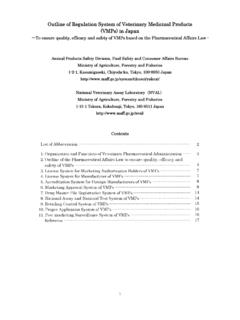Transcription of Good Clinical Practice (GCP).
1 International Council for Harmonisation of Technical Requirements for Pharmaceuticals for Human Use Route de Pr -Bois 20, 1215 Geneva, Switzerland Telephone: +41 (22) 710 74 80 - Final Concept Paper ICH E6(R3): Guideline for good Clinical Practice Dated 17 November 2019 Endorsed by the Management Committee on 18 November 2019 Type of Harmonisation Action Proposed The action proposed is a full rewrite and reorganization of the ICH E6(R2) Guideline entitled good Clinical Practice (GCP). The goal of this effort will be multifaceted and will include addressing the application of GCP principles to the increasingly diverse trial types and the data sources being employed to support regulatory and healthcare related decision-making on drugs, and provide flexibility whenever appropriate to facilitate the use of technological innovations in Clinical trials. The development of E6(R3) will address the complexities of Clinical trials in the current global regulatory climate.
2 The revision will retain the concepts and guidance in E6(R2) as appropriate. The scope will not be limited to those concepts, but will expand, modify, and reorganize all appropriate sections to provide scientific and ethical guidance that enables a diversity of approaches that are relevant and adaptable to the variety of Clinical trial designs and innovative technologies. The revision also aims to address identified gaps or inconsistencies in existing ICH guidances as appropriate. This work will set out principles which will be aligned with those set out in E8(R1) Revision of General Considerations for Clinical Studies. When complete, E6(R3) will be composed of an overarching principles and objectives document, Annex 1 (interventional Clinical trials), and Annex 2 (additional considerations for non-traditional interventional Clinical trials). The overaching principles and objectives document and Annex 1 will replace the current E6(R2).
3 The development of Annex 2 will commence once the principles and objectives document and Annex 1 complete ICH step 1. Statement of the Perceived Problem In the two decades since ICH E6 was first drafted, Clinical trials have become more complex with respect to trial design, use of technology, quantity of data collected and involvement of central testing facilities or other service providers. ICH E6(R2) was developed with multiple addenda to address the emerging use of electronic data sources and risk management processes. However, since the development of E6(R2), Clinical trials have continued to evolve with new designs and technological innovations. There is also a desire that E6(R3) should be developed to provide guidance that is applicable to different Clinical trial designs and to focus on key principles and objectives. E6(R2) included a focus on a proportionate, risk-based approach to the design and conduct of Clinical trials.
4 E6(R3) will be designed to further advance this concept and to encourage relevant parties to utilize this approach. FINAL E6(R3) Concept Paper Endorsed: 18 November 2019 -2- In addition, data generated initially for healthcare purposes outside of a Clinical trial or captured using innovative technological tools are being explored to serve an increasingly important role in supporting regulatory and healthcare decisions on drugs. However, E6(R2) is not fully designed to address emerging technologies, innovations in trial design, the diversity of data sources, testing facilities, and service providers, or to address other emerging complexities of the current Clinical trial climate. In the absence of a modernized guideline, reference may be made to the current provisions in E6, even though the requirements may not be fully adapted to these technologies, or stakeholders may fail to adopt the current requirements.
5 The application of the current standard to new technology is clearly challenging. Consequently, the design and conduct of trials, including in particular investigator site, test facility or service provider activities and record-keeping, may fail to take full advantage of technological innovations and the full potential of the risk-based considerations related to participant protection, data integrity or other public health considerations. Issues to be Resolved The new guideline will retain its focus on good Clinical Practice and will refer to relevant critical-to-quality factors similar to those identified in the E8(R1) Revision of General Considerations for Clinical Studies. Importantly, the guideline will provide flexibility to, among other things, accommodate the increased role of technology and variety of data sources in Clinical trials.
6 Increased reliance on electronic systems will also necessitate updating the language in the guideline on the validity of electronic systems, documentation and signatures, among other things. The proposed rewrite will include more specific discussions and refinement to E6 principles in the context of different trial types and data sources in the annexes as described below: Annex 1 - Interventional Clinical trials This will include the use of unapproved or approved drugs in a controlled setting with prospective allocation of treatment to participants and collection of trial data. This Annex will be developed simultaneously with the principles and objectives document to ensure consistency and to provide stakeholders with a complete package that can replace E6(R2); and Annex 2 - Additional considerations for non-traditional interventional Clinical trials This will include designs such as pragmatic Clinical trials and decentralized Clinical trials, as well as those trials that incorporate real world data sources.
7 Before the drafting of Annex 2, its scope will be further clarified, to define the nature of trials involved, in an update to this concept paper. The proposed E6(R3) revision work will initially involve the simultaneous development of the overarching principles and objectives document and the first annex to produce a unified package to replace ICH E6(R2). This approach will allow us to align the principles and objectives with the specific guidelines for interventional trials and enable the existing E6(R2) document to be superseded by simultaneous finalization of the principles and objectives document and Annex 1. FINAL E6(R3) Concept Paper Endorsed: 18 November 2019 -3- Background to the Proposal ICH E6(R2) good Clinical Practice ICH E8(R1) General considerations for Clinical studies FDA,United States, Guidance for Industry Oversight of Clinical Investigations A Risk-Based Approach to Monitoring, 2012 EC, Europe, EMA: Reflection Paper on Risk Based Quality Management in Clinical Trials, 2013 MHLW/PMDA, Japan, MHLW: Revision of the guidance on the ministerial ordinance on good Clinical Practice for Drugs, 2019 MHLW/PMDA, Japan, MHLW: Basic Principles of Quality Management in Clinical Trials, 2019 MHLW/PMDA, Japan, MHLW.
8 Basic Principles of Risk-Based Monitoring in Clinical Trials, 2019 ICH Q9, Quality Risk Management Clinical Trials Transformation Initiative workshops on quality by design and quality risk management TransCelerate Biopharma, Inc. risk-based monitoring resources Sensible Guidelines for the Conduct of Clinical Trials meetings, 2007-2012 OECD Recommendation on the Governance of Clinical Trials 2013 Risk proportionate approaches in Clinical trials Recommendations of the expert group on Clinical trials for the implementation of Regulation (EU) No 536/2014 on Clinical trials on medicinal products for human use 25 April 2017. ICH Reflection on GCP Renovation : Modernization of ICH E8 and Subsequent Renovation of ICH E6, 2017. Type of Expert Working Group and Resources The EWG will include experts from various disciplines including Clinical , statistical, data science, Clinical outcomes assessment, regulatory compliance, and potentially others.
9 The group should have overlap of expertise with the experts of the E8(R1) EWG and work in close collaboration with them. The work of the group will involve engagements with a variety of stakeholders including academia and patient advocacy groups throughout the development process. Timing This work is considered time-critical and highly anticipated by the regulated community. The working group was launched in September of 2019 and the first face-to-face meeting is scheduled for November of 2019. It is anticipated that the process to create the overarching principles and objectives document and Annex 1 is expected to take 18 - 24 months to reach Step 1, once the concept paper and business plan are endorsed. After the priniciples and objectives document and Annex 1 complete Step 1, the work on Annex 2 will commence.
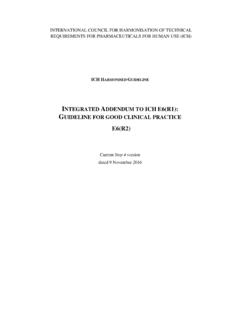

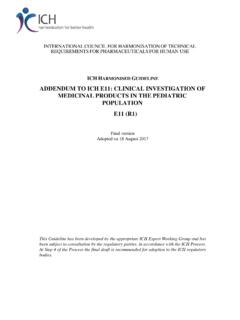
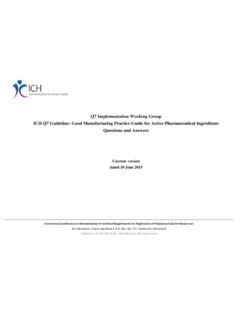


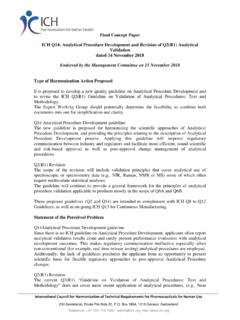
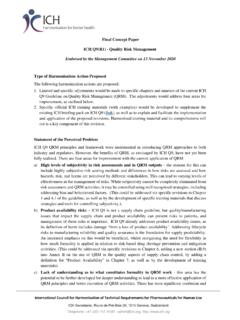
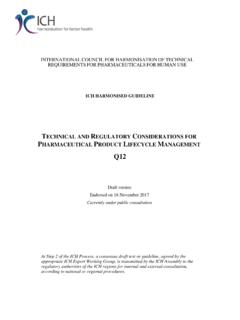
![[ICH E2F] [EXAMPLE DSUR – PHASE III INVESTIGATIONAL …](/cache/preview/e/7/a/2/e/6/3/0/thumb-e7a2e63043c4463724e748eb98faa3a7.jpg)

